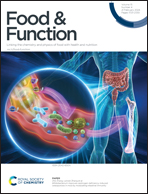A Capsicum annuum L. seed extract exerts anti-neuroexcitotoxicity in HT22 hippocampal neurons†
Abstract
The hippocampal memory deficit stands out as a primary symptom in neurodegenerative diseases, including Alzheimer's disease. While numerous therapeutic candidates have been proposed, they primarily serve to delay disease progression. Given the irreversible brain atrophy or injury associated with these conditions, current research efforts are concentrated on preventive medicine strategies. Herein, we investigated whether the extracts of Capsicum annuum L. seeds (CSE) and Capsicum annuum L. pulp (CPE) have preventive properties against glutamate-induced neuroexcitotoxicity (one of the main causes of Alzheimer's disease) in HT22 hippocampal neuronal cells. Pretreatment with CSE demonstrated significant anti-neuroexcitotoxic activity, whereas CPE did not exhibit such effects. Specifically, CSE pretreatment dose-dependently inhibited the elevation of excitotoxic elements (intracellular calcium influx and reactive oxygen species; ROS) and apoptotic elements (p53 and cleaved caspase-3). In addition, the glutamate-induced alterations of neuronal activity indicators (brain-derived neurotrophic factor; BDNF and cAMP response element-binding protein phosphorylation; CREB) were significantly attenuated by CSE treatment. We also found that luteolin is the main bioactive compound corresponding to the anti-neuroexcitotoxic effects of CSE. Our results strongly suggest that Capsicum annuum L. seeds (but not its pulp) could be candidates for neuro-protective resources especially under conditions of neuroexcitotoxicity. Its underlying mechanisms may involve the amelioration of ROS-mediated cell death and BDNF-related neuronal inactivity and luteolin would be an active compound.



 Please wait while we load your content...
Please wait while we load your content...